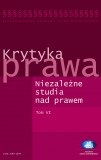Immediacy principle in the Roman criminal procedure
Immediacy principle in the Roman criminal procedure
Author(s): Andrzej ChmielSubject(s): Law, Constitution, Jurisprudence, Criminology
Published by: Akademia Leona Koźmińskiego
Keywords: Roman criminal procedure; immediacy principle; evidentiary proceedings; witness; defendant; testimony; explanations; interrogation report;
Summary/Abstract: In analysing the historical development of the Roman criminal procedure it should be observed that it followed the immediacy principle from the earliest times until the Justinian period. Adherence to this rule is best confirmed by the manner in which particular evidence was taken in the Roman criminal procedure, as well as by its judicial evaluation. The significance attached by Romans to the principle in question is corroborated primarily by an example of evidence obtained from a witness’s testimony. Already in the Republic period, testimony given personally by a witness before the court was preferred to testimony in the form of a document. Adherence to the immediacy principle in the Roman criminal procedure was manifested by the fact of preparing reports, initially comprising only certain decisions, e.g. judgements, and later all procedural actions. In the Empire period, the Roman criminal procedure was also dominated by the immediacy principle. The fact that the principle was adhered to is explicitly confirmed by the rescripts issued by Emperor Hadrian, expressing the demand that direct evidence be taken before the court, the reform of the irenarchae’s office implemented by Antoninus Pius, as well as a ban on legal assistance in criminal cases, confirmed by Justinian. Certain exceptions to the immediacy principle were allowed, such as submitting at a trial written laudationes prepared out of court and reports on interrogation of witnesses compiled during the proceedings, as well as admissibility of circumstantial evidence.
Journal: Krytyka Prawa
- Issue Year: 8/2016
- Issue No: 2
- Page Range: 2-16
- Page Count: 15
- Language: English

